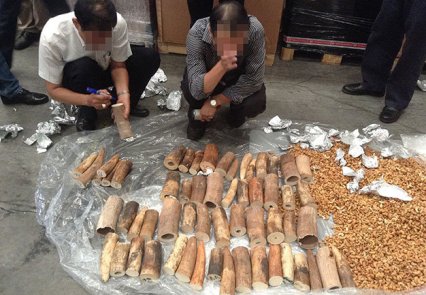Hundreds of kilograms of elephant tusks and rhinoceros horns worth nearly VND100 billion (US$4.8 million) smuggled into Vietnam have been detected this year by the customs office at Tan Son Nhat Airport in Ho Chi Minh City.
Because of the high value of the products on the black market, traffickers have used sophisticated methods to avoid detection by customs officers.
Even when a batch of the illegal goods is discovered, it’s still hard to identify the people behind the smuggling so they can be brought to justice.
Therefore a team of customs officers in charge of preventing the smuggling of the animal products at the airport has been nicknamed ‘the elephant tusk special forces’.
Nguyen Van Son, vice head of the ‘special forces’ team, said his team has nine members who take turns on duty day and night to ‘guard the gate’.
The cashew nut box
One day, a Turkish Airlines flight landed at Tan Son Nhat and the baggage was unloaded.
The ‘special forces’ team noticed a suspicious box whose freight bill said it contained cashew nuts imported into Vietnam from Africa.
The recipient of the box was a transport company in Hanoi, and it had been sent by a person named C.F.
Many questions were raised by the team, such as why it had been transported to Tan Son Nhat in Ho Chi Minh City and not Noi Bai Airport in Hanoi, and why cashew nuts had been sent from Africa to Vietnam, a major cashew producer.
The suspicions were reported to the commanding board and Do Thanh Quang, head of the Customs at Tan Son Nhat Airport, decided to start a secret investigation before the recipient sensed danger and abandoned the goods.
Scouts arrived at the address of the recipient company in Hanoi but found that it was a virtual address.
It was suspected that the smugglers had used a wrong address to avoid local authorities in case the goods were discovered, Quang recalled.
Unable to identify a person in charge of the shipment, the officers decided to open the box. Inside, 59 elephant tusks cut into pieces and weighing over 40kg were hidden under dozens of kilograms of cashew nuts.
The tusk pieces were covered by tin foil, which was believed to neutralize scanning machines.
Members of the ‘special scouting team’ often monitor the loading and unloading of cargo on/from planes.
The scouts are also equipped with binoculars with both day and night vision, which help them discover any tiny abnormal signs from cargo.
“A single elephant tusk is worth 7 – 10 billion dong [or US$337,000 – 481,000] and they are often sent by air, with the address on the freight bill a virtual one.
“If the parcel is checked, the owner abandons it easily,” said Tong Le Dan, vice head of Customs at Tan Son Nhat Airport, adding that the owners of the packages monitor their goods when they land at the airport.
Traffickers are thus willing to lose goods, but not people, he said.
Scouts sometimes track motorbike taxi drivers who come to receive a large amount of goods sent by air.
It takes a lot of time to identify the traffickers in a given case, Dan said.
Employees who are trained to operate scanning machines are often given canned food so they can practice identifying objects through the images and colors displayed on the scanning monitor.
Since the start of the year, the team has tracked six smuggling cases involving 300kg of elephant tusks valued at over VND18 billion ($865,000), 13kg of rhinoceros horns worth at VND15 billion ($721,000), and drugs.






















































